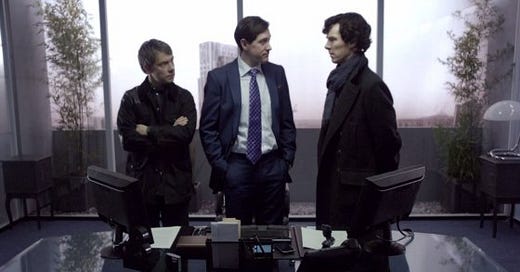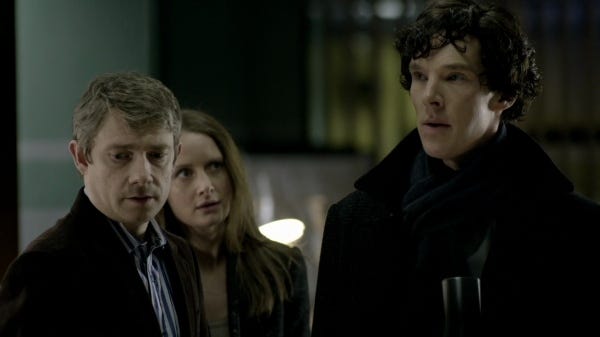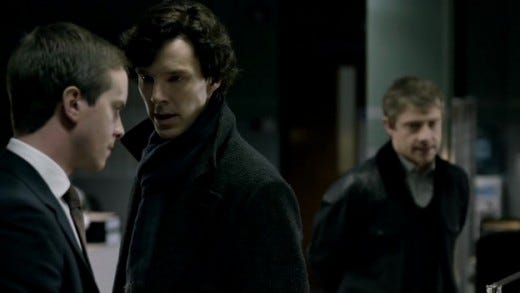Retrospective Review #2: The Blind Banker
Just a reminder: I’m opening up all these Retro-reviews to be now free to read. They’re mostly re-posted from derelict Sherlock-dedicated website, Sherlock’s Home. My byline there was Prof. Jenn, and as SH was a UK-based site, my spelling and punctuation reflects that. This post was first published in September of 2015, and I’ve tweaked it just a little bit since then.
Written by Prof. Jenn
Reminder: I am writing these as RETROSPECTIVE reviews, so I will be discussing reveals, revolutions of cliffhangers, ends of plots, etc. If you are reading these reviews without having seen the eps, a) what is wrong with you?? Go watch them now! and b) these reviews are not for you till you’ve seen them.
‘The Blind Banker’ is the one episode of Sherlock that has been the subject of the most negative criticism and contention of any other in the series.* There’s one main reason for this, in my opinion, but other than that one sweeping problem, as a basic Sherlockian mosaic of a murder mystery it has a lot going for it. Too bad it’s been spoiled by racist stereotypes.
Yep, that’s the stuff that really ruins it. Good old fashioned Yellow Peril-style British racism. But I’ll get into that later. *Actually, now that Series 4 has been fully out and experienced by all, methinks any of those three episodes are probably more denigrated than this one. Racist representation notwithstanding, all of Series 4 is actually worse, and I think many Sherlock fans would agree.
‘The Blind Banker’ finds us with some cute exposition of how Sherlock and John have been getting on domestically (though juxtaposed with this we get our first bout of Orientalism: an opponent in robes and a turban fights Sherlock with a scimitar while stereotypical “Arabian Nights” type music plays. Sigh). We learn that John is broke, and so he finds a job (and thereby a girlfriend) as a general practitioner, something he does in the original Doyle stories as well. Meanwhile, an old cohort of Sherlock’s from university asks him to investigate a mysterious symbol left in the bank.
What entails is a very ‘The Dancing-Men’–like foray into code breaking, with the added touch of finding the key to the cipher code in commonly-owned books, like in The Valley of Fear. We end up getting captured by a Tong called the Black Lotus (another sigh), and Sherlock saves the day by the skin of his teeth, as usual. And there’s sacred Chinese pottery and a case of mistaken identity. And circus arts. Doesn’t sound so bad, right?
Well… Allow me to simply list out for you only a handful of the many harmful Asian stereotypes replete in this ep:
Oo, the scary Yellow Peril in the form of the Tong.
Not one, but two Asian woman stereotypes: the China Doll and the Dragon Lady (for more on these and other stereotypes in this ep, read this article).
The supernaturally agile assassin (ninja, anyone?) leaves an origami lotus at the scene of each murder. Thing is, origami is Japanese, not Chinese. So are ninja.
Same comment re: the shopkeeper in Chinatown with the vaudeville accent, asking John in pidgin English if he wants to buy a Lucky Cat. The maneki neko is a Japanese icon.
I was actually okay with the Chinese smugglers posing as a circus troupe, but others have found this to be a stereotype as well, in the vein of Fu Manchu.
FINAL THOUGHT: All this is super unfortunate, as there was plenty of promise with the bickering dynamic duo, John starting to date and go into medical practice, and the beginning of us meeting more of Sherlock’s Irregulars in the form of a graffiti artist. But all of this fun stuff and canon nods and character development ends up tarnished under all the cringey Asian stereotypes.
EASTER EGG: the dynamic between the younger detective Dimmock and Sherlock putting him in his place is nicely reminiscent of a canon exchange between Holmes and Inspector Forbes in ‘The Naval Treaty.’
From ‘The Naval Treaty’:
[Forbes] was decidedly frigid in his manner to us, especially when he heard the errand upon which we had come.
“I’ve heard of your methods before now, Mr. Holmes,” said he, tartly. “You are ready enough to use all the information that the police can lay at your disposal, and then you try to finish the case yourself and bring discredit on them.”
“On the contrary,” said Holmes, “out of my last fifty-three cases my name has only appeared in four, and the police have had all the credit in forty nine. I don’t blame you for not knowing this, for you are young and inexperienced, but if you wish to get on in your new duties you will work with me and not against me.”
“I’d be very glad of a hint or two,” said the detective, changing his manner. “I’ve certainly had no credit from the case so far.”
Doesn’t this smack of Dimmock’s change in attitude from ‘The Blind Banker?’:
DIMMOCK: (Without joy): I know who you are. And I’d prefer it if you didn’t tamper with any of the evidence.
(and then later:)
DIMMOCK: Anything else I can do? (Pause.) To assist you, I mean.
But really, nothing beats the late great Jeremy Brett’s nearly-canon-verbatim delivery in the Grenada series: “…you will work WITH me, and NOT against me!” (Forbes enters at 28:40, but the whole ep is stellar.)
RATING: 2 dancing men out of 5
Feel free to leave your thoughts or your own review of ‘The Blind Banker’ in the comments!






